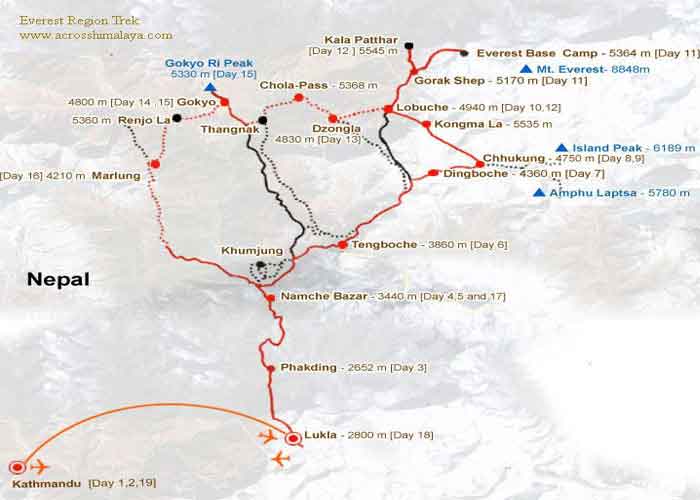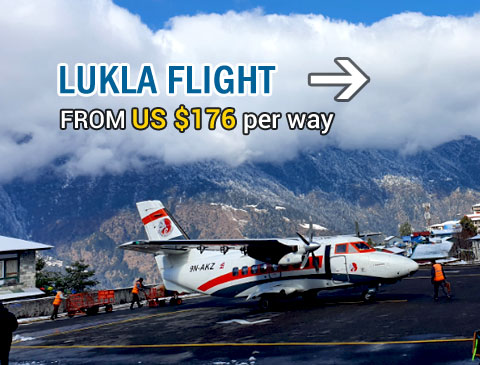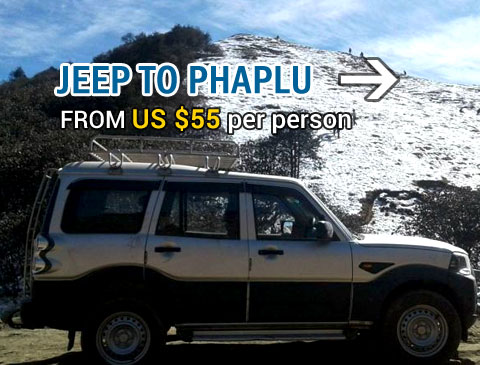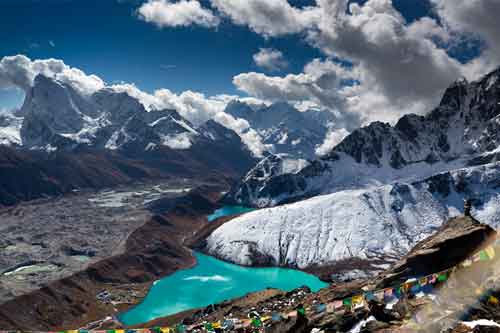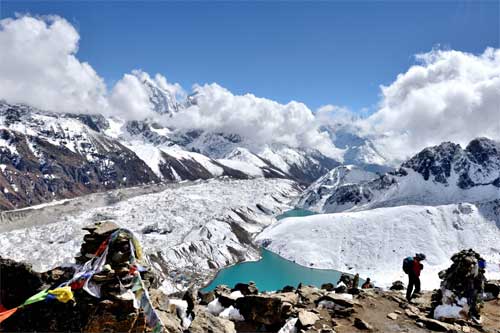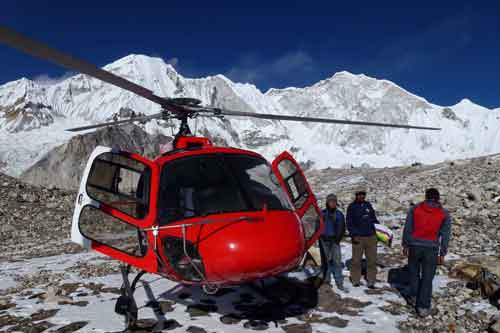Island Peak Climbing with EBC

Island Peak, also known as Imja Tse, is a popular climbing destination in the Khumbu region of Nepal. Located in the Sagarmatha National Park, Island Peak stands at an elevation of 6,189 meters (20,305 feet). The peak's distinct shape and challenging ascent make it a favorite among trekkers and mountaineers alike. Many people choose to combine an Island Peak climb with a trek to Everest Base Camp (EBC). This allows them to not only experience the beauty of the Khumbu region but also to challenge themselves with a technical climb. The EBC trek takes around 12-14 days, while the Island Peak climb usually takes an additional 3-4 days.
Once at EBC, climbers will have a chance to rest and prepare for the Island Peak climb. The climb requires technical skills such as ice axe and crampon use, and climbers must be physically fit and acclimatized to the altitude. The climb usually takes two days, with one night spent at a high camp before reaching the summit. The summit of Island Peak offers stunning views of the surrounding Himalayan peaks, including Lhotse, Nuptse, and Makalu. Climbers often feel a sense of accomplishment and awe at having conquered such a challenging peak.
Island Peak climbing with EBC is a once-in-a-lifetime experience that combines the beauty of the Khumbu region with the thrill of a technical climb. It requires physical fitness, technical skills, and a sense of adventure, but the reward of standing on the summit is well worth the effort.
Island Peak Climbing with EBC Trek Itinerary
Day 01: Arrival in Kathmandu
Arrive at Tribhuvan International Airport in Kathmandu and transfer to your hotel. Attend a pre-expedition briefing with your climbing guide, who will provide you with information and answer any questions regarding the upcoming climb.
Day 02: Kathmandu Sightseeing and Preparation
Spend the day exploring Kathmandu and visit UNESCO World Heritage Sites like Pashupatinath Temple, Boudhanath Stupa, and Kathmandu Durbar Square. Prepare and organize necessary equipment for the climb. Overnight stay in Kathmandu.
Day 03: Flight to Lukla and Trek to Phakding
Take an early morning scenic flight from Kathmandu to Lukla. Start trekking towards Phakding (2,610 meters) through lush forests and picturesque villages along the Dudh Koshi River. Overnight stay in Phakding.
Day 04: Trek to Namche Bazaar
Continue trekking along the Dudh Koshi River, crossing suspension bridges and passing through Sagarmatha National Park. Arrive at Namche Bazaar (3,440 meters), the bustling Sherpa town and the gateway to the Everest region. Overnight stay in Namche Bazaar.
Day 05: Acclimatization Day in Namche Bazaar
Spend a day in Namche Bazaar for acclimatization. Take a short hike to Syangboche Airstrip or Khumjung Village to enjoy panoramic views of Everest, Lhotse, and other peaks. Overnight stay in Namche Bazaar.
Day 06: Trek to Tengboche
Continue trekking to Tengboche (3,867 meters), home to the famous Tengboche Monastery. Enjoy magnificent views of Everest, Lhotse, and Ama Dablam along the way. Attend the evening prayer ceremony at the monastery. Overnight stay in Tengboche.
Day 7: Trek to Dingboche
Trek from Tengboche to Dingboche (4,410 meters), a beautiful village nestled in a high valley. Enjoy stunning views of Everest, Lhotse, and Island Peak along the way. Overnight stay in Dingboche.
Day 08: Acclimatization Day in Dingboche
Another day for acclimatization in Dingboche. Take short hikes to higher altitudes, such as Chhukung (4,730 meters), to aid acclimatization and enjoy the panoramic views. Overnight stay in Dingboche.
Day 09: Trek to Lobuche
Continue trekking to Lobuche (4,940 meters), a small settlement located close to the Khumbu Glacier. The trail offers incredible views of peaks like Nuptse, Pumori, and Khumbutse. Overnight stay in Lobuche.
Day 10: Trek to Everest Base Camp and Gorak Shep
Trek from Lobuche to Everest Base Camp (5,364 meters), a challenging but rewarding journey. Explore the base camp, take pictures, and soak in the awe-inspiring surroundings. Trek back to Gorak Shep (5,160 meters) for overnight stay.
Day 11: Hike to Kala Patthar and Trek to Chhukung (4,730m /15,518ft)
Early morning hike to Kala Patthar (5,545 meters) for a panoramic sunrise view of Everest, Lhotse, and other peaks. Descend to Gorak Shep and continue trekking to Chhukung (4,730 meters), the base village for Island Peak climbing. Overnight stay in Chhukung.
Day 12: Trek to Island Peak Base Camp
Trek from Chhukung to Island Peak Base Camp (5,200 meters). Enjoy the mesmerizing views of the surrounding peaks and glaciers. Begin preparations for the climb. Overnight stay at Island Peak Base Camp.
Day 13: Summit Island Peak and Return to Chhukung
Summit day! Start early in the morning to climb Island Peak (6,189 meters). Reach the summit and savor the breathtaking views. Descend back to Island Peak Base Camp and continue trekking back to Chhukung. Overnight stay in Chhukung.
Day 14: Spare Summit Day
An extra day is kept as a buffer in case of unfavorable weather conditions or other contingencies. It can also be utilized for additional acclimatization or rest if not needed for the summit climb.
Day 15: Trek back to Namche Bazaar
Descend from Chhukung to Namche Bazaar, retracing the trail through Pangboche, Tengboche, and Phakding. Overnight stay in Namche Bazaar.
Day 16: Trek back to Lukla
Continue the trek downhill, crossing suspension bridges and enjoying the last glimpses of the majestic mountains. Arrive at Lukla and celebrate the completion of your climb. Overnight stay in Lukla.
Day 17: Flight to Kathmandu
Take an early morning flight from Lukla to Kathmandu. Spend the day in Kathmandu, relaxing, shopping for souvenirs, or exploring the city.
Day 18: Departure
Transfer to the airport for your departure, or extend your stay to explore more of Nepal's attractions.
Costs included:
- Airport transfers in Kathmandu.
- Accommodation in Kathmandu (before and after the expedition).
- Accommodation during the trek and climb in teahouses, lodges, and tents.
- Meals (breakfast, lunch, and dinner) during the trek and climb.
- Climbing permits and entry fees for Sagarmatha National Park.
- Island Peak climbing permit and associated fees.
- Liaison officer fees for the expedition.
- Expedition support staff, including climbing guide, Sherpas, and porters.
- Mountaineering equipment and gears (tents, ropes, ice axes, crampons, etc.).
- Oxygen cylinders and high-altitude medical kits.
- Insurance coverage for climbing guide and support staff.
- Internal flights (Kathmandu to Lukla and return).
Costs excluded:
- International flights to and from Kathmandu.
- Nepalese visa fees.
- Personal travel insurance (including evacuation and medical insurance).
- Personal climbing equipment and gears.
- Personal expenses such as additional meals, snacks, drinks, and tips.
- Extra nights' accommodation in Kathmandu due to delays or early return.
- Charges for excess baggage on flights.
- Costs incurred in case of early termination of the climb.
- Additional services not mentioned in the inclusions.
Fixed Departure
| Start Date |
End Date |
Trip Price | Availability | Book This Trip |
| 2024 / 2025 |
March to May Oct to December |
USD $ 2100 | Conformed | Book Now |
Note: If the above departures dates are not matched for you may request own your suitable date!
Useful Information
What is Island Peak?
- Island Peak, also known as Imja Tse, is a popular trekking peak in the Everest region of Nepal. It stands at an elevation of 6,189 meters (20,305 feet) and offers stunning panoramic views of the surrounding Himalayan peaks.
Is prior climbing experience necessary for Island Peak Climbing with EBC?
- Prior climbing experience is recommended but not mandatory for Island Peak Climbing. However, participants should have a good level of physical fitness, trekking experience at high altitudes, and be comfortable with basic mountaineering skills like using crampons and ice axes. It is advisable to have some prior experience with rock and ice climbing.
When is the best time for Island Peak Climbing with EBC?
- The best time for Island Peak Climbing with EBC is during the pre-monsoon (spring) and post-monsoon (autumn) seasons. The pre-monsoon season, from March to May, offers stable weather and good climbing conditions. The post-monsoon season, from September to November, has clear skies and excellent visibility. These seasons provide the best chances of a successful climb.
Do I need a climbing permit for Island Peak?
- Yes, a climbing permit is required for Island Peak Climbing. The permit can be obtained through the Department of Tourism in Nepal. It is recommended to apply for the permit well in advance through a registered trekking agency or expedition operator.
What kind of accommodation can I expect during the climb?
- Accommodation during the trek and climb usually consists of teahouses or lodges along the trail. These provide basic facilities such as shared rooms and communal dining areas. During the climb, camping accommodation is set up at the base camp and higher camps.
What type of equipment do I need for Island Peak Climbing?
- You will need personal climbing equipment such as mountaineering boots, crampons, harness, ice axe, helmet, and climbing ropes. It is recommended to consult with your expedition operator for a comprehensive list of required equipment. They may also provide equipment rental services.
How challenging is the Island Peak climb?
- Island Peak is considered a moderately difficult climb. It involves steep sections, glacier crossings, and some technical sections. The climb requires good physical fitness, acclimatization, and basic mountaineering skills. Prior training and preparation are essential to increase your chances of a successful summit.
Can Island Peak Climbing be combined with other treks?
- Yes, Island Peak Climbing is often combined with the Everest Base Camp trek. This allows you to experience the beauty of the Khumbu region and reach the iconic Everest Base Camp before attempting the peak. It is advisable to consult with your trekking agency or expedition operator for customized itineraries that suit your preferences.

